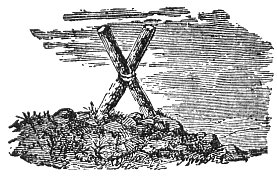The Ophites commenced their system with a Supreme Being, long unknown to the Human race, and still so the greater number of men; the Βυθὸς [Buthos], or Profundity, Source of Light, and of Adam-Kadmon, the Primitive Man, made by the Demiourgos, but perfected by the Supreme God by the communication to him of the Spirit [Πνεῦμα . . Pneuma]. The first emanation was the Thought of the Supreme Deity [the Ἔννοια . . Ennoia], the conception of the Universe in the Thought of God.
p. 563
[paragraph continues] This Thought, called also Silence (Σιγη . . Sige), produced the Spirit [Πνευμα . . Pneuma], Mother of the Living, and Wisdom of God. Together with this Primitive Existence, Matter existed also (the Waters, Darkness, Abyss, and Chaos), eternal like the Spiritual Principle. Buthos and His Thought, uniting with Wisdom, made her fruitful by the Divine Light, and she produced a perfect and an imperfect being, Christos, and a Second and inferior wisdom, Sophia-Achamoth, who falling into chaos remained entangled there, became enfeebled, and lost all knowledge of the Superior Wisdom that gave her birth. Communicating movement to Chaos, she produced Ialdabaoth, the Demiourgos, Agent of Material Creation, and then ascended toward her first place in the scale of creation. Ialdabaoth produced an angel that was his image, and this a second, and so on in succession to the sixth after the Demiourgos: the seven being reflections one of the other, yet different and inhabiting seven distinct regions. The names of the six thus produced were IAO, SABAOTH, ADONAI, ELOI, ORAL, and ASTAPHAI. Ialdabaoth, to become independent of his mother, and to pass for the Supreme Being, made the world, and man, in his own image; and his mother caused the Spiritual principle to pass from him into man so made; and henceforward the contest between the Demiourgos and his mother, between light and darkness, good and evil, was concentrated in man; and the image of Ialdabaoth, reflected upon matter, became the Serpent-Spirit, Satan, the Evil Intelligence. Eve, created by Ialdabaoth, had by his Sons children that were angels like themselves. The Spiritual light was withdrawn from man by Sophia, and the world surrendered to the influence of evil; until the Spirit, urged by the entreaties of Wisdom, induced the Supreme Being to send Christos to redeem it. Compelled, despite himself, by his Mother, Ialdabaoth caused the man Jesus to be born of a Virgin, and the Celestial Saviour, uniting with his Sister, Wisdom, descended through the regions of the seven angels, appeared in each under the form of its chief, concealed his own, and entered with his sister into the man Jesus at the baptism in Jordan. Ialdabaoth, finding that Jesus was destroying his empire and abolishing his worship, caused the Jews to hate and crucify Him; before which happened, Christos and Wisdom had ascended to the celestial regions. They restored Jesus to life and gave Him an ethereal body, in which He remained eighteen months on earth, and receiving from Wisdom the perfect
p. 564
knowledge [Γνωσις . . Gnosis], communicated it to a small number of His apostles, and then arose to the intermediate region inhabited by Ialdabaoth, where, unknown to him, He sits at his right hand, taking from him the Souls of Light purified by Christos. When nothing of the Spiritual world shall remain subject to Ialdabaoth, the redemption will be accomplished, and the end of the world, the completion of the return of Light into the Plenitude, will occur.
Tatian adopted the theory of Emanation, of Eons, of the existence of a God too sublime to allow Himself to be known, but displaying Himself by Intelligences emanating from His bosom. The first of these was His spirit [Πνευμα . . Pneuma], God Himself, God thinking, God conceiving the Universe. The second was the Word [Λογος . . Logos], no longer merely the Thought or Conception, but the Creative Utterance, manifestation of the Divinity, but emanating from the Thought or Spirit; the First-Begotten, author of the visible creation. This was the Trinity, composed of the Father, Spirit, and Word.
The Elxaïtes adopted the Seven Spirits of the Gnostics; but named them Heaven, Water, Spirit, The Holy Angels of Prayer, Oil, Salt, and the Earth.

Moe is the founder of GnosticWarrior.com. He is a father, husband, author, martial arts black belt, and an expert in Gnosticism, the occult, and esotericism.





